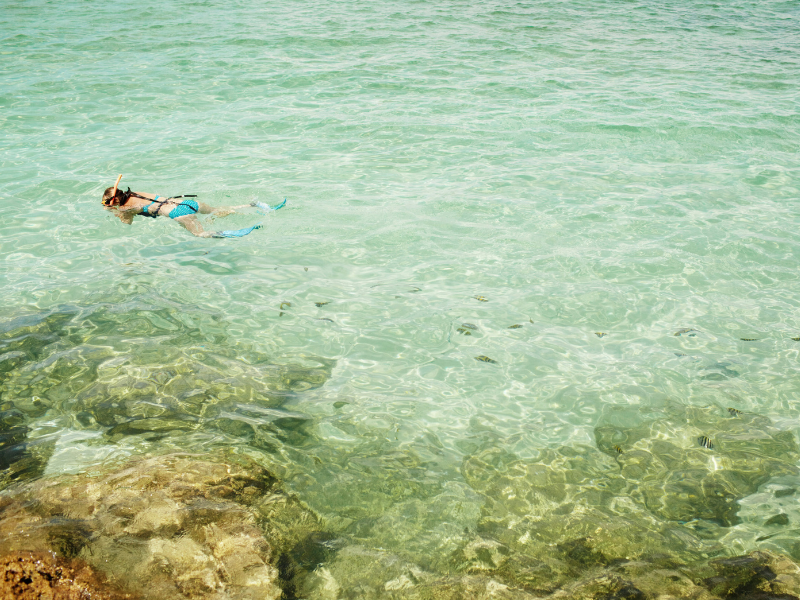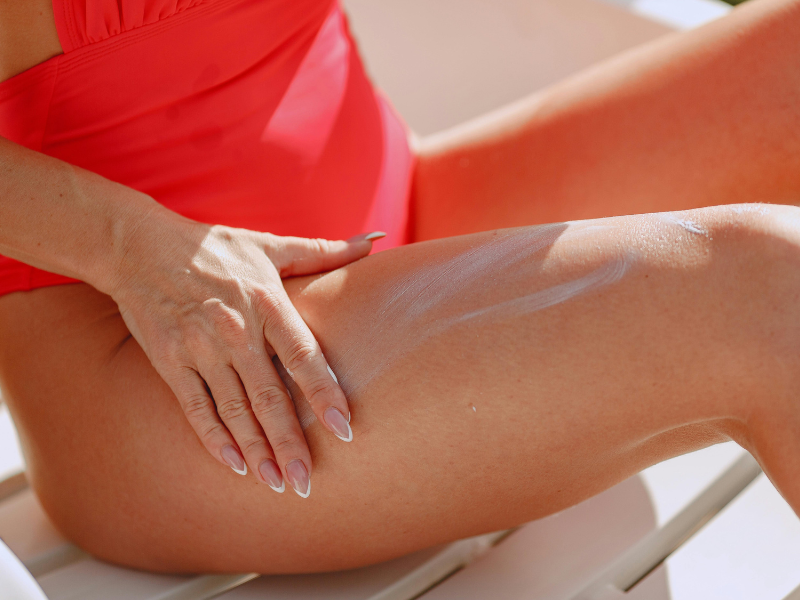How To Protect Skin When Swimming This Summer

In the warm summer months, there’s nothing better than enjoying a swim in the water to cool us down. And whether that’s a swimming pool or the sea on holiday, it’s something we all look forward to.
But is swimming bad for your skin? It can be, and it’s important to be aware of the effects that chlorine and salt water can have on our face and body.
Chlorine found in swimming pools can strip away the natural oils we produce, leading to dryness, irritation, and potential long-term damage to our skin.
And the risks don’t change when it comes to swimming in the sea. Although the mineral content of seawater can be beneficial, it can also lead to dryness, irritation, and an increased risk of infection due to bacteria in the water.
Some skin conditions will be more sensitive to see water, as many also ask is sea water good for eczema? Well, it depends on the severity of your skin condition. The minerals in seawater, such as magnesium and calcium, can help to hydrate and soothe dry, irritated skin, which can be a benefit for some people with eczema. But, some individuals might find that sea water irritates their skin, especially if they have an allergy to certain substances in the water.
As such, our team here at SmoothSkin have detailed the steps you should take before going swimming to avoid any summer skin irritation from chlorine or sea water.
The Before Swimming Skin Care Tips You Should Follow

Swimming is one of summer’s greatest joys, and with the right preparation, it doesn’t have to come at a cost to your skin or hair.
By taking a few simple steps, you can dive in with confidence, and enjoy all the benefits of the water, without the unwanted side effects on your skin.
1. Apply a barrier cream or oil
Before entering a pool or the sea, applying a gentle yet protective layer to your skin, such as a rich moisturiser, barrier cream, or even a light layer of natural oil (like coconut or jojoba oil) can help lock in moisture and create a shield against the harsh elements in the water, helping to avoid dry skin after swimming.
Some swimming pools may advise against this, as the products can break down and potentially contaminate the water, so be sure to check their regulations before jumping in the deep end.
But, is chlorine bad for your skin? Believe it or not, there are some benefits of chlorine on skin – by breaking down our natural oils, chlorine can help reduce the ‘greasy look’ of our skin, and temporarily ease conditions that can cause acne.
However, it’s still important to protect our skin as much as possible, as chlorine can cause a skin rash from swimming, so barrier creams and oils will help to keep your skin hydrated, preventing any harsh dryness when it comes to sea water and skin.
2. Rinse before you swim
It might sound strange, but simply rinsing your skin and hair with clean tap water before getting into the pool or sea can actually help the condition of your skin.
Besides basic hygiene and maintaining pool cleanliness, if your skin and hair are wet, they will absorb fewer chemicals and less salt, reducing the potential for dryness or irritation after your swim.
This is because the water already present on your skin can create a barrier, stopping any other substances from being absorbed.
3. Choose the correct sunscreen
The importance of skin care for swimming pool visits is incredibly important, especially if swimming outdoors in a warm country as another element you will be affected by is the sun. But not all formulas are created equal, and there are various SPF myths to be aware of.
As such, it’s important to look for a water-resistant, broad-spectrum sunscreen that’s kind to both your skin and the ocean. And remember to reapply your SPF the moment you’ve dried off from your swim, and again every 2 hours.
Mineral sunscreens with zinc oxide or titanium dioxide are often gentle on the skin, and are less likely to cause irritation, so opt for these products when doing your holiday shop.
4. Avoid hair removal right before swimming
Before a holiday, many of us like to remove our body hair. In fact, our research found that nearly three-quarters (72%) of UK women feel more self-conscious about their leg hair during the summer than any other point of the year.
As well as this, nearly 4 in 5 (78%) of women bring razors on holiday with them, suggesting that their removal regime before jetting off won’t see them through the entire holiday.
And it’s important to be safe when shaving, as using razors can leave small nicks or irritations on the skin, making it more vulnerable to stinging, dryness, infection, and other summer irritations caused by hair removal.
Try to shave at least 24 hours before swimming to give your skin time to recover, and avoid dry shaving which can cause further irritation and potential infection from pool and sea water.
However, If you use hair removal treatments such as an IPL device (Intense Pulsed Light), avoid doing so immediately before swimming. Freshly treated skin will be more sensitive, and prone to irritation, especially when exposed to chlorine or saltwater. Therefore, it’s best to wait at least 24 hours before taking a dip.
3 After-Swim Skin Care Tips

So, now that we’ve had our summertime swim, it’s important to continue protecting our skin from the water we’ve just encountered. As such, we’ve listed 3 after-swim skin care tips that you should follow:
1. Rinse off immediately
As soon as you leave the water, it’s a good idea to rinse your skin and hair with fresh water in the shower, and many public beaches or swimming pools offer free showers which is a bonus.
By doing this, you can help to remove any chlorine, salt, and other residues that may have accumulated on your body, and avoid any effects such as a skin rash from swimming.
2. Moisturise thoroughly
After your shower, it’s recommended to follow up with a gentle, hydrating body lotion or cream to replenish any lost moisture from the water.
Using products with ingredients such as hyaluronic acid, aloe vera, and shea butter are especially effective at soothing your post-swim skin.
3. Exfoliate gently
To keep your skin smooth and prevent any ingrown hairs, exfoliate at least two to three times a week using a body scrub or exfoliating mitt.
This is particularly helpful if you’re using hair removal treatments, or shaving regularly, and will keep your skin healthy, and avoid any blotchy skin after swimming.
